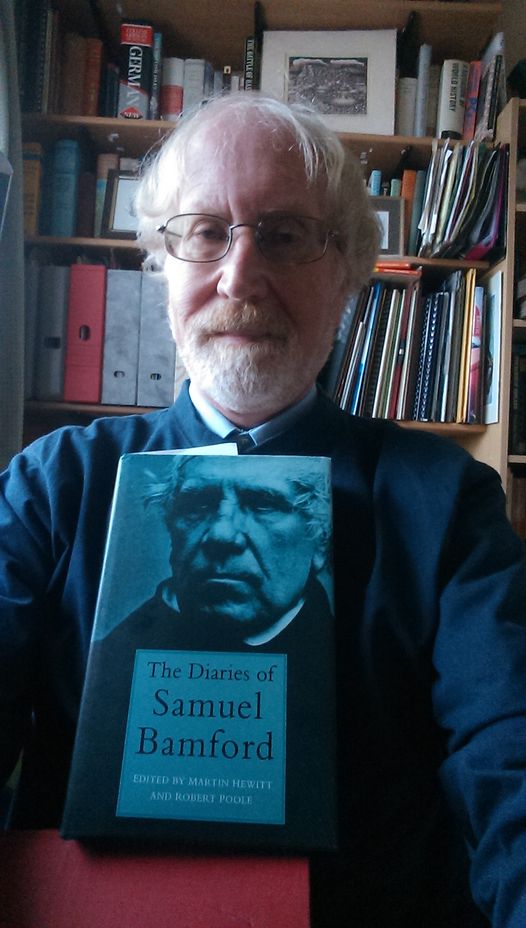SAMUEL BAMFORD – The Radical Weaver Boy
SAMUEL BAMFORD – The Radical Weaver Boy
by Michael Higgins

This April commemorates the 150th anniversary of Samuel Bamford’s death (1788-1872). I have been asked to participate in a celebratory event of Sam’s life on 16th April, in his home town of Middleton, where I will be reading from Samuel Laycock’s dialect tribute to Sam and singing one of Sam’s songs. For Sam, best known as the author of Early Days and Passages In The Life Of A Radical, was also a poet and songwriter as well as a political orator and participant in the Peterloo affair. Sam (left) was also a Lancashire Dialect scholar.
Neil Bell, who played Bamford in the film, Peterloo, and the Lancaster choir, Gladly Noisome Sound, will help to celebrate his life on that day
Along with Royton’s John Kay and William Fitton, Bamford was a stalwart of the local Hampden political clubs formed after 1812 in the wake of the Luddite disturbances, the slump in trade during the Napoleonic Wars, the ill- fated blanketeers’ march, and the run up to the Peterloo Massacre. Indeed the argument for universal suffrage and parliamentary reform had touched him as a little boy in the 1790s when reformists from Royton had perambulated the streets of Middleton and there had been a loyalist witch hunt afterwards looking for anyone supposedly supporting the aims of the French Revolution. This was the time of the notorious Royton Races.

Sam had not joined the Blanketeers’ reformist march to London, but was arrested as a conspirator nonetheless. In thrilling terms he relates his journey from Middleton to Royton via prison coach and dragoon escort in Passages In The Life of a Radical (shown right) .

He describes stopping at the Rose Of Lancaster pub in Chadderton (left) where the landlord Edward O’ Connor was arrested, sympathetic crowds running along the skyline of Chadderton Heights and Tandle Hills, as they approached Royton. Then followed the arrest of John Howarth and his wall hammer at Royley, and a raucous ride to see the magistrates at The Spread Eagle in Oldham. ‘Theawr’t a moderate length to begin wi’ but theaw’ll be lunger afore theaw comes back to Reighton’, threatened Constable Nadin in the local dialect to poor John Howarth, as to a possible a hanging, After an interview before the Privy Council in London Sam was eventually released and he returned home to his wife and handloom. Sam turned to weaving silk but during his absences faithful Jemima often did the weaving.
Middleton then included Thornham, and Sam, led his group of reformers up to Tandle Hill for military drilling in the days and weeks prior to the Peterloo gathering in the summer of 1819. Here several hundred men went through their march routines, platoon firing (clapping of hands to simulate the rattle of musketry) and advancing and retiring in step. He led the Middleton contingent to Peterloo preceded by a band of music, and he and his wife Jemima, or ‘Mima’, were on the field when the crowd was dispersed first by the Manchester and Salford Yeomanry, the 15th Hussars and the Cheshire Yeomanry. Mima ended up taking refuge in a cellar and Sam escaped the best he could before both being reunited on the long walk home.

Sam was arrested at his house one evening after at two o’clock in the morning and his house was searched for treasonable writings. All the constables found were copies of his recently published poems called The Weaver Boy (right), which he offered to the officers but was refused. He spent a year in Lincoln Gaol, after which he rented a cottage at Stakehill, known as Spout Cottage. Both he and Mima grew to love it. His poems A View From The Tandle Hills In The Month Of May, and Farewell To My Cottage were written here, or about here, as was his song The Stakehill Ball. One of his songs, My Wynder, is written to Mima, celebrating her role as his bobbin winder in the handloom weaving process. At Stakehill, Sam tells us, that the local children referred to Mima as ‘gronny’ and himself as ‘uncle’. In the strange streets of London he later lamented with bitter regret his old cottage ‘With its honeybind garland at window and door/As prime as a bride when the revels begin’.
After his time in London as a clerk and a spell as a Manchester area newspaper reporter, Sam settled in Moston and Harperhey, where he died on April 13, 1872. In his later years he eked out a meagre living by giving talks and recitals, while selling copies of his own works. He spoke many times in Royton during the Peterloo years and visited like-minded political friends in the neighbourhood after. One poignant reminder of this time is the now sadly neglected and derelict Park Lane House House in Royton at the bottom of Sandy Lane. This house was built in 1812 on the site of Mr Taylor’s garden opposite the public house known as the Light Horseman. Joseph Taylor was its landlord and here in April 1794 the vicar of Royton had sat on the garden fence urging on a loyalist mob to storm it and apprehend the reformist ‘Jacobins’ meeting inside. The resulting riot and dispersal of a public meeting became euphemistically termed ‘The Royton Races’
In July 1859, aged 71, Sam relates in his diary that he walked from Werneth railway station to Royton to visit John Buckley, who lived at the house and owned the cotton mill behind it, and who had ordered a copy of Passages In The Life Of A Radical. Mr Buckley was out but was expected home for dinner at One o’clock. Sam retired to a public house nearby to wait (The Hare and Hounds in Sandy Lane?), where he nearly fell asleep over a glass of ale. A youth came to fetch him and he dined with the family of five sons and two daughters present with one son absent. He had a glass of punch after dinner and Mr Buckley gave Sam not only the money for Passages but for a copy of his Early Days as well – a sum totalling seven shillings. Sam then walked to Middleton before taking the local horse drawn ‘omnibus’ home.
I cannot walk by Park Lane House now without thinking of Sam and the turbulent times he lived through.

Michael Higgins (shown left with a copy of The Diaries Of Samuel Bamford) enjoys local history studies, dialect poetry, story-tellings and poetry recitals. Along with fellow poets Bard From The Baum he has recently moved a very short distance across town, sharing in the re-branding of the recital group to Pegesus, at The Flying Horse in Rochdale. As part of a Morris team he has taken part in dances, rushbearings and festivals and various other important historical remembrances such as one reported on in-depth by Mancunian Matters on line. The Rise Like Lions encouragement for gatherers at Peterloo has been described as ´ ´the greatest political poem´ and was even referenced by Ghandi,
it was in 2014 that Michael took part in a commemoration of Peterloo as one of many readers of Shelley´s free verse working with Reading Director, Paul Jelen, as part of a project devised by another Rochdale writer, Eileen Earnshaw. Both Paul and Eileen have featured frequently on these pages.
Michael´s article today was first published in The Bugle and was followed by the opening remarks of the Chairman, which reminded us that, in Societies such as these, key workers are as vital as they are hard to find.
The Chairman’s Message that opened this current edition of The Bugle told us that ´There’s quite a lot been happening during our New Year break. Sometime in March work will begin on the Library and Town Hall refurbishment. Because of this we were asked to remove all our items that we’ve had stored in the Library cellar for the past few years. Most of these are artefacts from the archaeological digs that we carried out between 2005 and 2008.´
The Chairman, Geoff Oliver, wrote that Rather than throw these away because we have nowhere else to store them, we asked the Local Interest Library in Oldham if they would take them. An expert came from there and went through all the objects. Any that were of interest were taken up there, the rest were disposed of.
The tools were distributed between a ladies gardening group that cared for the gardens at a Bolton Hospice and the Royton Park gardening project. Crockery to Trinity Methodist Church for their Thursday Coffee mornings. Shelving and gazebos to Oldham Amateur Radio Club. I’d like to thank Frances Stott for her help and all the work she did to facilitate this.
If you are local historian buff yourself, or if you have secretarial skills, you may be interested in the The Chairman´s closing remark that society secretary, Pat Abram, has said that she will have to reluctantly step down from the job at the end of this season in July. From then on we will need a new secretary. If anyone feels thy can take on this role, please let me know as soon as possible. In the meantime, I’d like to thank Pat for everything she’s done on our behalf.
Royton Local History Society on the Internet at www.rlhs.co.uk
A member of The British Association for Local History
A member of the Friends of Real Lancashire

*Editor´s note Neil Bell (left) , mentioned at the top of Michael´s article as a star of Mike Leigh’s historic political protest drama, Peterloo, has since presented a new short film encouraging people to visit the city of Manchester and learn more about the landmark story for themselves.

Neil Bell, who played radical reformer Samuel Bamford in Peterloo, guided viewers through the history of the Peterloo Massacre, exploring locations in Manchester where visitors could discover more about the history of the tragic events that unfolded on 16 August 1819.
Commissioned jointly by Marketing Manchester and Manchester Histories, the film formed part of a city-wide series of events marking the 200th anniversary of Peterloo.
Manchester Histories led Peterloo 2019 (peterloo1819.co.uk – #Peterloo2019) a programme of activity that marked the 200th anniversary of the Peterloo Massacre. From June – August 2019 there were over 150 public events scheduled across Greater Manchester and beyond.
A trailer for the Peterloo Visitor Film was premiered to an audience of 400 people at the launch of Peterloo 2019 at the Manchester Central Convention Centre, which features within the film and overlooks the former location of St Peter’s Field, where more than 60,000 people gathered in 1819 to demand parliamentary reform. The peaceful protest was crushed by massed government forces, killing 18 people and leaving more than 700 injured. Protestors had been calling for the right to vote, parliamentary representation for the people of Manchester and a repeal of the Corn Laws, “That tragedy was also a defining moment for the city and it’s fitting that so many events are taking place this year to mark the 200th anniversary of the Peterloo Massacre.
“It was a real privilege to retrace the steps of those protesters and learn more about the historical context of modern Manchester. I hope this film will encourage others to do the same.”
Karen Shannon, Chief Executive of Manchester Histories, said: “There is a huge amount for us to learn from about the events that were to lead to Peterloo; how a peaceful protest was to end in a day of bloodshed and the consequences that were to follow.
“Yet awareness levels of this milestone in our democracy are still relatively low, even within Greater Manchester. This film will help to connect people to this history and to understand why it has such relevance to our lives today.”
Sheona Southern, Managing Director of Marketing Manchester, said: “Peterloo was a tragic turning point in the history of Manchester, helping to ignite the spirit of defiance and progress that survives to this day.
“The city has changed massively in 200 years but there are still links to the past all around and I hope that this film will inspire people to come to Manchester and learn more about the history of democracy for themselves.”
Set against the beautiful backdrop of modern Manchester, Neil Bell retells the story of Peterloo, calling in at locations including the People’s History Museum, Manchester Central, Midland Hotel, Radisson Blu Edwardian Hotel – formerly the Free Trade Hall and The Britons Protection public house.
The Peterloo Visitor Film project was led by Marketing Manchester’s Manchester Content Curator Simon Donohue working with videographer Nick Hulme of One Smart Cookie.
For more information and interview requests, contact Simon Donohue on 07850 955413 – simon.donohue@marketingmanchester.com.




Leave a Reply
Want to join the discussion?Feel free to contribute!